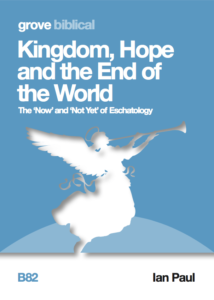As we approach Advent once more, we are confronted with issues around the End of the World. What was Jesus talking about in Matthew 24 and Mark 13? Did he and his earliest followers expect the world to end in their lifetime? What about popular ideas like the ‘rapture’ and the ‘tribulation’? Are they found in the New Testament? What really is the nature of Christian hope?
Come and join me on Saturday 28th October from 9.30 to 12.30 on Zoom to explore all these questions and more! Book on Eventbrite here.
This teaching morning will explore the language the New Testament uses about the ‘end of the world’ (also known as ‘eschatology’) and why it is so important to understand it properly. We will look at:
a. The background to this language in Jewish thinking
b. Jesus’ teaching in Matthew 24 and Mark 13
c. The Rapture—what is it, and does the Bible really teach it
d. What the New Testament says about ‘tribulation’
e. The beast, the antichrist, and the Millennium in Rev 20
f. The significance of the State of Israel
We will be debunking some common myths, and seeing what the New Testament really teaches. And we will explore the pastoral importance of getting our thinking right on this important subject. There will be a chance for some interaction and for asking questions.
The session does not require any prior expert knowledge; we will be looking carefully at the text of the New Testament and what is says in its own context.
 Why not come as a group from your church?
Why not come as a group from your church?
The price is a bargain £10 for the whole morning, finishing at 12.30 sharp. Book online at Eventbrite here.
Much of the material we will cover is written up in my Grove booklet Kingdom, Hope, and the End of the World: the ‘now’ and ‘not yet’ of eschatology.
Look out for upcoming online teaching events:
Sat 25th November: an introduction to Mark’s gospel for the lectionary year
Sat 9th December: how to make sense of the Book of Revelation




























Hi
Thankyou, I will be attending the zoom meeting, I did purchase your book “making sense of the end of the world” whilst at the Keswick convention in July, I think! I bought many books and haven’t read this particular one yet.
I am an evangelical Christian from dudley and am looking forward to having many questions looked into.
Many blessing
Annie wilson
Great! Look forward to seeing you then!
(It is sometimes easier to listen to someone than to read a text!)
On reflection I bought your book when I listened to your talk on revelation at Worcester diocesan evangelical fellowship in Redich with a few of my church family and our Vicar Nick.
Which incidentally was excellent.
Many blessings
Annie
Good on you Ian, very few have focused preaching on the events of the last days in the last few decades.
Your programme looks to at least give an introduction to this vast subject.
I hope it will stimulate far reaching, further attention to these climatic events.
In general, this topic reminds me of Donald Rumsfeld’s famous quote: –
“There are known knowns, things we know that we know; and there are known unknowns, things that we know we don’t know. But there are also unknown unknowns, things we do not know we don’t know.” Rumsfeld initially defines “unknown knowns” as “the things you think you know, that it turns out you did not”,
This quote was and is a cognitive psychology tool developed in The Johari window and/or house; And from Heuristic (psychology). Heuristics (from Ancient Greek εὑρίσκω, heurískō, “I find, discover”) Worth a look-up.
On the study of eschatology it seems a good starting point
Ther are things we do know as there are several indicators [as in cars] to define the direction of travel.
There are known unknowns, e.g. as in time lines and chronologies [and very many conjectures to boot]
. But there are also unknown unknowns, things we do not know we don’t know.” Rumsfeld initially defines “unknown knowns” as “the things you think you know, that it turns out you did not”,
“The LORD our God has secrets known to no one. We are not accountable for them, but we and our children are accountable forever for all that he has revealed to us, so that we may obey all the terms of these instructions. Deuteronomy 29:29 New Living Translation (NLT)